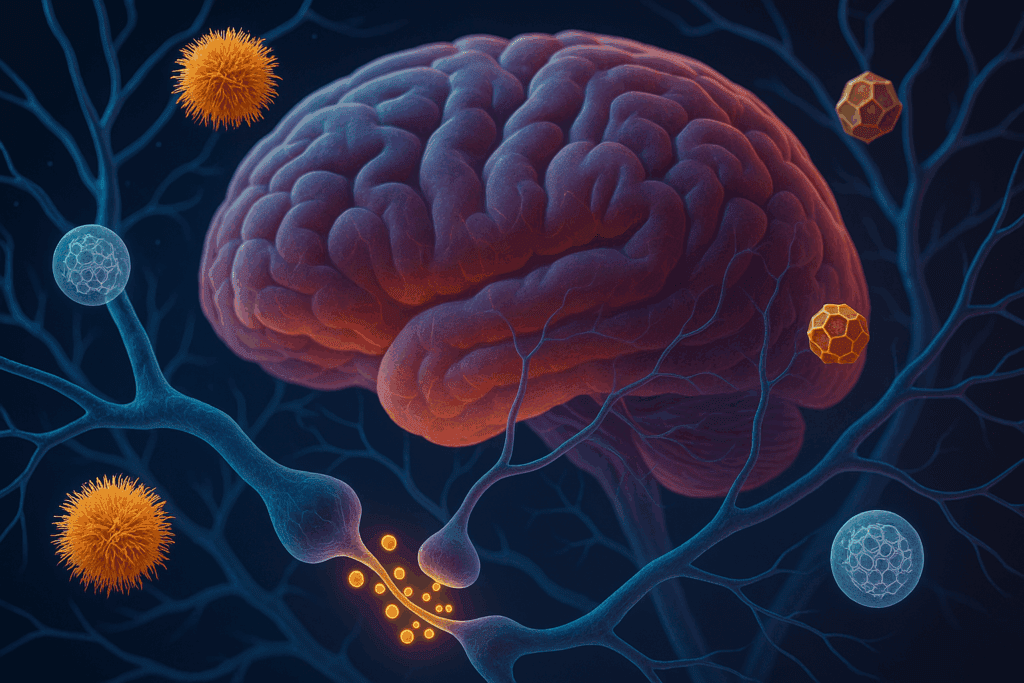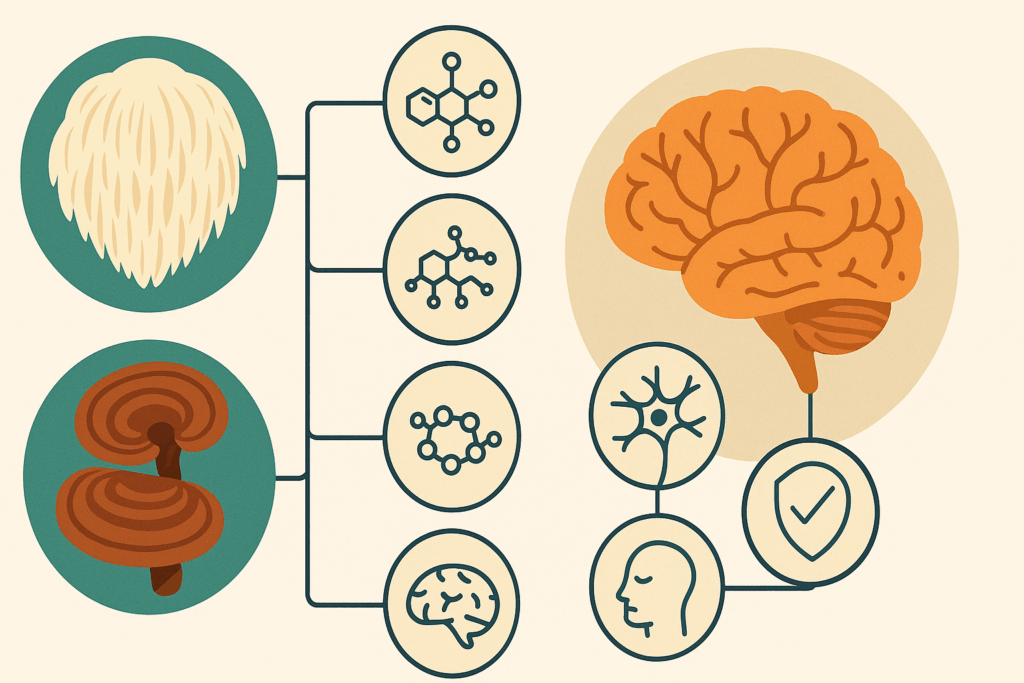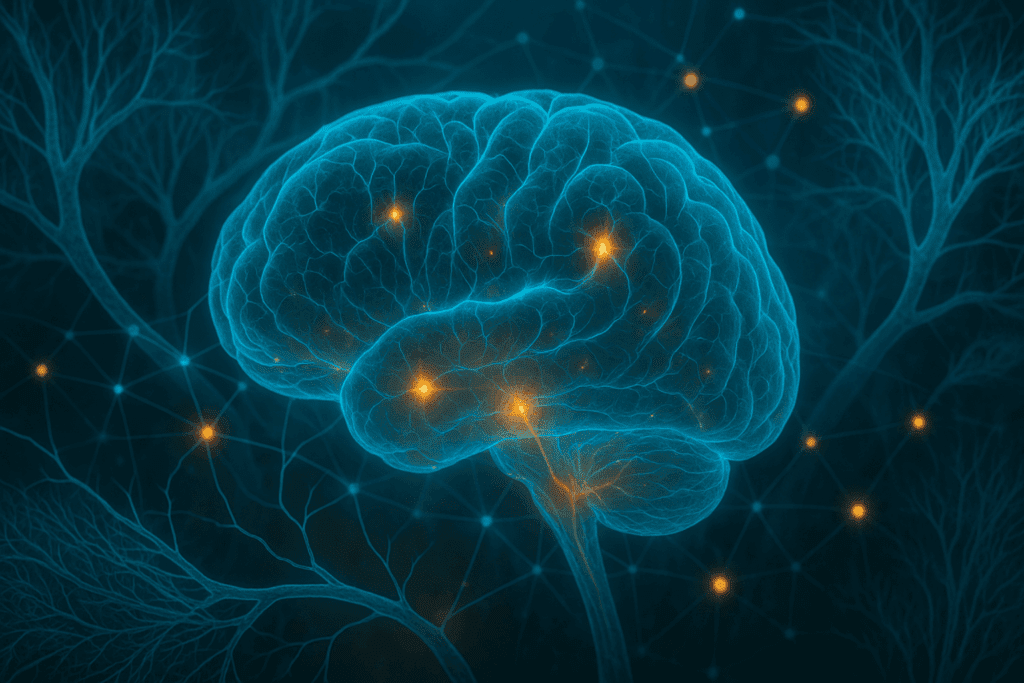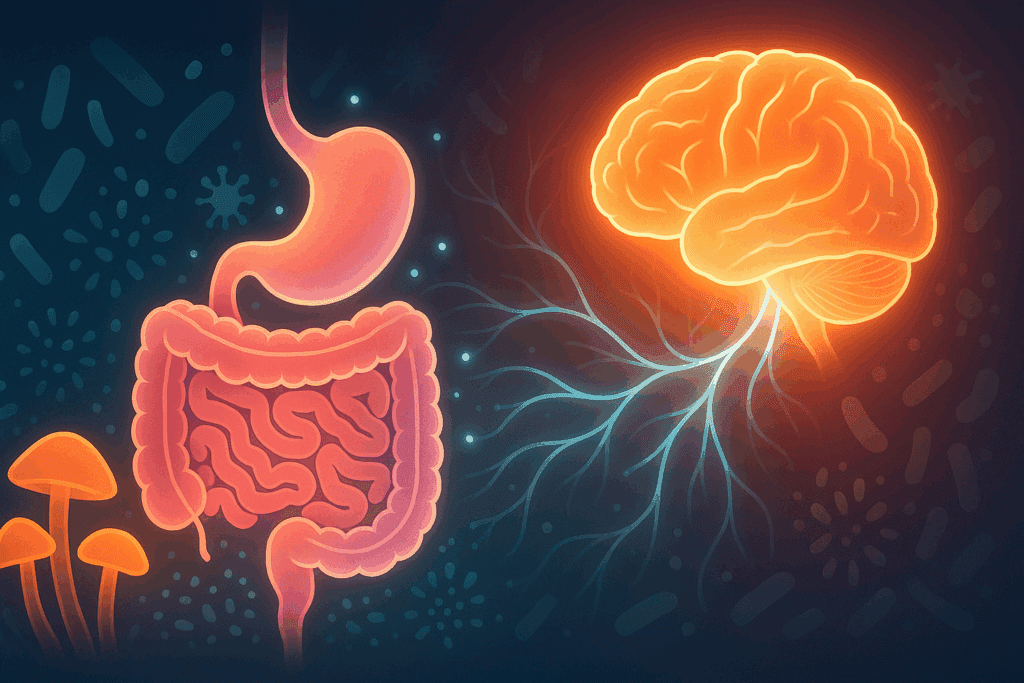Introduction: Unlocking the Cognitive Secrets of Nature’s Neural Network
In recent years, science has increasingly turned its gaze toward the natural world in search of novel solutions for improving mental clarity, memory, and cognitive function. Among the most promising discoveries is the powerful and often underestimated network of fungal roots known as healthy mycelium. This vast underground structure, forming the backbone of forest ecosystems, is not only critical to environmental health but may also hold the key to optimizing human brain performance. The term “healthy mycelium” refers to the thriving, bioactive form of mycelia that retains its full spectrum of beneficial compounds. As research evolves, this remarkable substance is being studied for its nootropic potential and its role in enhancing neurological resilience, supporting memory, and fostering long-term brain health.
You may also like: The Ultimate Guide to the Best Nootropic Mushrooms for Memory and Cognitive Enhancement

The Biological Intelligence of Mycelium: Nature’s Hidden Neural System
Healthy mycelium forms the underground root-like structures of fungi, interweaving with plant roots and other organic matter to form a communication network often likened to the brain or a neural net. This comparison is more than poetic: studies have shown that mycelium transmits chemical signals across vast distances, facilitating nutrient sharing, defense signaling, and even environmental adaptation. In essence, it mirrors the function of a primitive nervous system, making it uniquely positioned as a candidate for human cognitive enhancement.
The structure of mushroom mycelia is composed of hyphae—tiny filamentous tubes that grow and branch endlessly through soil and decaying wood. These hyphae not only extract nutrients but also exhibit behaviors that suggest a form of decentralized problem-solving. When healthy mycelium is ingested in the form of extracts or supplements, some of its biochemical intelligence may be conferred to the human body. Although still under exploration, this hypothesis supports the growing belief that integrating mycelial compounds into one’s daily regimen may enhance neuroplasticity and cognitive vitality.

Healthy Mycelium and the Brain: How Mycelial Networks Influence Cognitive Health
When we explore the cognitive impact of healthy mycelium, we delve into the intersection of nutrition, neurochemistry, and adaptogenic biology. Mycelium mushroom supplements derived from species such as Lion’s Mane (Hericium erinaceus), Cordyceps, and Reishi are known to contain potent bioactive compounds, including hericenones, erinacines, beta-glucans, and triterpenoids. These compounds have been shown to stimulate the production of Nerve Growth Factor (NGF), an essential protein involved in the maintenance and regeneration of neurons.
Furthermore, mycelium benefits extend to supporting mitochondrial function, reducing oxidative stress, and balancing neurotransmitter levels. These actions collectively result in improved mental clarity, faster recall, and increased focus. Healthy mycelium also contributes to the body’s anti-inflammatory response, which is crucial in mitigating age-related cognitive decline and preventing neurodegenerative diseases such as Alzheimer’s and Parkinson’s. In clinical and preclinical trials, users of mycelium mushroom extracts reported measurable improvements in memory retention, stress resilience, and mood stabilization.
Is Mycelium Harmful to Humans? Addressing the Safety and Efficacy of Mycelial Supplements
As public interest in mushroom mycelia surges, so too do concerns around its safety and potential side effects. It is a common question among skeptics and newcomers alike: is mycelium harmful to humans? The overwhelming consensus among scientists and health professionals is that, when sourced and processed responsibly, healthy mycelium is not only safe but highly beneficial.
The key lies in ensuring purity and cultivation standards. Reputable producers grow mycelium on organic substrates and use advanced extraction techniques to preserve bioactive compounds without introducing contaminants. Mycelium products should always be third-party tested for heavy metals, mycotoxins, and microbial purity. When these standards are met, the risk of harm is minimal.
Furthermore, healthy mycelium is generally considered hypoallergenic and non-toxic. Side effects are rare and usually mild, including gastrointestinal discomfort in sensitive individuals. More importantly, its adaptogenic nature allows the body to regulate stress and immune responses without causing dependency or tolerance, making it an ideal candidate for long-term brain support.

Healthy Mycelium in Nootropic Mushroom Supplements: A New Era of Brain Enhancement
The nootropic movement—focused on enhancing cognitive function through natural or synthetic means—has embraced healthy mycelium as a powerful botanical ally. Mycelium mushroom supplements offer a comprehensive approach to mental performance by targeting multiple pathways in the brain simultaneously. Unlike traditional stimulants that offer a short-lived boost, mycelial compounds work to rebuild and rejuvenate the brain’s structural and functional integrity.
Mushroom mycelia deliver sustainable mental energy without the jittery aftermath of caffeine or the crash associated with synthetic enhancers. Users report increased focus, deeper learning capacity, and better memory recall within weeks of consistent use. Some of the most popular and effective mycelium mushroom blends include synergistic combinations of Lion’s Mane for neurogenesis, Cordyceps for ATP production, and Reishi for stress modulation. Together, these fungi form a cognitive support system that is both powerful and sustainable.
Mycelium mushroom benefits extend even further when combined with other holistic practices such as mindfulness meditation, clean eating, and adequate sleep. This integrative approach amplifies the effects of mycelial supplements, reinforcing their role as a foundational element of a nootropic lifestyle.
The Science Behind Mycelium Benefits: Clinical Research and Emerging Insights
While traditional medicine has long revered fungi for their healing properties, modern science is only beginning to uncover the full extent of mycelium benefits. A growing body of clinical and preclinical research is shedding light on the neuroprotective and neuroregenerative effects of healthy mycelium, particularly from species like Hericium erinaceus and Ganoderma lucidum.
One landmark study conducted in Japan found that daily supplementation with Lion’s Mane mycelium improved cognitive function in elderly patients with mild cognitive impairment (MCI). After 16 weeks, participants showed statistically significant improvements in memory and attention span, with no adverse effects. The results were attributed to the high concentration of NGF-stimulating compounds in the mycelial extract.
Other studies have demonstrated the antioxidant capacity of mycelium mushroom extracts in combating oxidative stress, a major contributor to age-related brain decline. These findings suggest that regular intake of healthy mycelium may delay the onset of cognitive deterioration and enhance mental agility well into old age. Moreover, ongoing research into the gut-brain axis reveals that mycelium may also promote cognitive health by supporting the microbiome, further broadening its spectrum of benefits.

Boosting Memory Naturally with Healthy Mycelium-Infused Practices
Incorporating healthy mycelium into daily routines can yield substantial gains in memory and focus. While supplements provide a concentrated source of bioactive compounds, lifestyle integration plays a pivotal role in maximizing their impact. One effective strategy is to consume mycelium mushroom tinctures or capsules in the morning, when the brain is most receptive to stimulation. Pairing this with light exercise or a brief meditation session can enhance neuroplasticity and mental clarity.
Memory-specific benefits of mushroom mycelia are enhanced when users adopt habits that challenge the brain, such as learning new languages, solving puzzles, or engaging in strategic games. The bioactive agents in healthy mycelium create a fertile internal environment for neural regeneration, but it is mental activity that activates and reinforces these new pathways.
Nutrition also plays a complementary role. A diet rich in omega-3 fatty acids, antioxidants, and plant-based proteins supports the same pathways targeted by mycelium compounds. Hydration, sleep hygiene, and stress management further amplify the effects, creating a comprehensive ecosystem for cognitive excellence. Ultimately, healthy mycelium works best when it is not isolated but integrated into a lifestyle devoted to mental vitality.
Debunking Myths: Is Mycelium Harmful to Humans or an Untapped Brain Booster?
Despite its increasing popularity, the question still persists in public discourse: is mycelium harmful to humans? This misconception often arises from confusion between mycelium and toxic mushroom species, or from poorly processed supplements that lack quality assurance. In truth, mycelium—particularly healthy mycelium grown in sterile, controlled environments—is one of the safest and most well-tolerated natural supplements available.
Regulatory agencies and academic institutions continue to affirm the safety profile of mycelial products when consumed as directed. The toxicity concerns generally stem from environmental contamination or misidentification of wild fungi, not from the mycelium itself. When obtained from reputable sources, mycelium mushroom supplements offer an unparalleled level of purity and potency.
Dispelling myths is essential to encouraging broader public acceptance of mycelial nootropics. Transparency in sourcing, manufacturing, and clinical validation can help bridge the gap between traditional skepticism and scientific confidence. As the evidence continues to mount, the safety and efficacy of healthy mycelium for brain health become increasingly difficult to ignore.

Healthy Mycelium as a Preventative Brain Health Strategy
In an era where cognitive disorders are on the rise and mental performance is in high demand, preventative approaches are more vital than ever. Healthy mycelium offers a forward-thinking solution grounded in nature and backed by science. Its ability to nurture the brain’s long-term health while enhancing immediate mental function makes it a valuable asset in both clinical and personal wellness settings.
Preventative brain health strategies benefit greatly from the inclusion of adaptogens, antioxidants, and neurotrophic agents—all of which are found in abundance in mycelium mushroom extracts. These compounds support the brain’s resilience to stress, toxins, and age-related degeneration. They also encourage the formation of new neural connections, bolstering both short-term memory and long-term cognitive preservation.
Whether used as part of a formal wellness protocol or as a daily supplement, healthy mycelium can help individuals stay ahead of cognitive decline. It empowers people to take control of their mental trajectory, leveraging the wisdom of nature to build a stronger, sharper mind for years to come.
Harnessing Mushroom Mycelia to Combat Cognitive Fatigue in Modern Lifestyles
Cognitive fatigue is a growing concern in today’s fast-paced, overstimulated world. Prolonged exposure to digital screens, multitasking, and chronic stress often lead to mental exhaustion and diminished cognitive output. Against this backdrop, healthy mycelium has emerged as a promising natural intervention for reducing mental fatigue and supporting sustained focus throughout the day. Studies have shown that mushroom mycelia contain adaptogenic compounds that modulate cortisol levels, helping the body maintain balance during periods of high stress and cognitive demand. These compounds include beta-glucans and triterpenes, which interact with the hypothalamic-pituitary-adrenal (HPA) axis to reduce mental weariness and increase resistance to fatigue.
Incorporating mycelium mushroom supplements into a daily routine has shown promise in preventing mental burnout, particularly for professionals, students, and individuals navigating high-responsibility roles. Unlike caffeine or synthetic nootropics, which often lead to dependency or adrenal fatigue, healthy mycelium provides a steady, grounded sense of energy and clarity. This sustained support allows the brain to operate efficiently without the rollercoaster of highs and crashes commonly associated with other stimulants. Moreover, by reducing neuroinflammation and improving mitochondrial health, mycelium benefits extend into long-term cognitive stamina.
Practitioners of natural medicine increasingly recommend mushroom mycelia as part of holistic brain wellness regimens. The key is consistency—daily intake of mycelium mushroom extracts, combined with mindful breathing exercises or short meditative breaks, offers cumulative advantages. Over time, individuals report better task switching, increased productivity, and a more resilient mental state. For those asking, “Is mycelium harmful to humans?” the answer becomes clear through practical experience: not only is it safe, but it is a vital tool in restoring cognitive equilibrium and combating the silent epidemic of brain fatigue in the digital age.

Healthy Mycelium and Neuroplasticity: Cultivating a Flexible, Adaptive Mind
One of the most exciting frontiers in cognitive neuroscience is the concept of neuroplasticity—the brain’s ability to reorganize itself by forming new neural connections throughout life. While once thought to decline after early adulthood, neuroplasticity is now recognized as a lifelong capacity that can be influenced by environmental stimuli, mental engagement, and nutrition. Among the most compelling natural agents supporting this adaptive brain function is healthy mycelium. With its unique chemical profile, mushroom mycelia stimulate brain-derived neurotrophic factor (BDNF) and NGF, both of which are central to the growth and repair of neurons.
Scientific investigations into mycelium mushroom benefits show that these bioactive compounds help regenerate synaptic connections, particularly in regions associated with memory and executive function. By encouraging the survival of existing neurons and the formation of new ones, healthy mycelium aids in keeping the brain agile and responsive, even in the face of aging or injury. This is particularly important in today’s context, where the ability to learn new skills, adapt to changing environments, and maintain cognitive health into later life has become a valuable asset.
Furthermore, individuals recovering from brain injuries or neurodegenerative conditions may benefit significantly from mushroom mycelia supplementation. While not a cure, these natural compounds provide an enriched internal environment conducive to healing and adaptation. Equally, for healthy individuals, they serve to optimize brain function and guard against cognitive stagnation. Integrating these practices into daily life—such as pairing mycelium mushroom extracts with intellectual hobbies, brain games, or even musical training—can maximize these neuroplastic effects.
In this light, it is not surprising that healthy mycelium is being explored as a therapeutic aid in both clinical and non-clinical settings. As interest continues to grow, so does the evidence supporting its role in maintaining cognitive fluidity and enhancing one’s mental potential across the lifespan.

Exploring the Gut-Brain Axis: How Healthy Mycelium Enhances Mental Wellness from Within
The gut-brain axis has garnered significant attention in the scientific community as researchers uncover the profound connection between digestive health and cognitive function. At the heart of this relationship lies the human microbiome—a complex ecosystem of microorganisms that influence everything from mood and energy to memory and learning. Emerging evidence now suggests that healthy mycelium can play a vital role in supporting this axis, acting as both a prebiotic and immunomodulator. By fostering a healthy microbial environment, mushroom mycelia enhance not just digestive function but also cognitive performance and emotional balance.
One mechanism by which healthy mycelium benefits the brain is through its impact on gut bacteria composition. Compounds found in mycelium, particularly from Reishi and Turkey Tail mushrooms, encourage the proliferation of beneficial microbes while reducing the presence of pathogenic strains. This microbial balance translates to reduced gut inflammation, which in turn has been linked to lower levels of neuroinflammation—a critical factor in maintaining mental clarity and reducing symptoms of anxiety or depression.
Moreover, the gut produces over 90% of the body’s serotonin, a neurotransmitter crucial for mood regulation. Healthy mycelium appears to support the natural synthesis of serotonin and other neurochemicals by improving nutrient absorption and decreasing inflammatory markers that disrupt hormone balance. This suggests that mycelium mushroom benefits may extend into the realm of emotional resilience and stress tolerance, offering a grounded approach to mental wellness.
For those who still wonder, “Is mycelium harmful to humans?” this expanded perspective further dispels the myth. Far from harmful, mushroom mycelia serve as foundational support for both physical and mental health, aligning the systems of the body in harmony. Integrating mycelial extracts into a diet rich in fiber, fermented foods, and diverse plant nutrients amplifies these effects, reinforcing the gut-brain connection as a pillar of cognitive well-being.
The Sustainable Intelligence of Mushroom Mycelia: A Future-Forward Approach to Brain Health
In a world increasingly seeking sustainable health solutions, the cultivation and use of mushroom mycelia stand as a model of ecological and physiological intelligence. Unlike synthetic pharmaceuticals that often come with long-term side effects and high production costs, healthy mycelium offers a renewable, low-impact, and highly adaptable solution to brain health. It grows rapidly on agricultural byproducts, requires minimal water, and naturally regenerates the soil, making it one of the most environmentally responsible sources of cognitive support.
Beyond its ecological advantages, the intelligence embedded in the structure of healthy mycelium provides a metaphor—and perhaps a blueprint—for enhancing human brain networks. Just as mycelial networks connect forest ecosystems and redistribute resources to support life, so too do mycelial supplements strengthen human neural pathways, optimize energy use, and create systemic resilience. Mycelium mushroom benefits include not only personal health gains but also alignment with broader goals of planetary sustainability and conscious living.
Incorporating healthy mycelium into educational, corporate, or healthcare settings reflects a shift toward preventative, holistic, and nature-informed models of wellness. Schools might explore mushroom mycelia to improve focus and behavior in students, while high-performance professionals may leverage its cognitive edge for strategic thinking and problem-solving. Healthcare providers increasingly recognize mycelial compounds as adjunct therapies for mood disorders, ADHD, and memory loss.
As the scientific community continues to validate these effects, and as public demand grows, healthy mycelium is likely to become a cornerstone of 21st-century cognitive care. It represents not merely a supplement, but a philosophy—one that values interconnectedness, sustainability, and the profound intelligence of nature. When asking, “Is mycelium harmful to humans?” we are now positioned to respond with confidence: on the contrary, it is one of the most intelligent gifts nature has to offer in our journey toward optimal brain health.
Frequently Asked Questions About Healthy Mycelium and Brain Health
1. What makes healthy mycelium uniquely effective for supporting mental clarity?
Healthy mycelium stands out due to its synergy of naturally occurring compounds that interact with the nervous system in subtle yet powerful ways. Unlike isolated synthetic ingredients found in typical nootropics, mycelium mushroom extracts provide a matrix of antioxidants, polysaccharides, and neurotrophic agents that work in concert. These compounds don’t just stimulate brain activity—they help regulate it, making cognitive processes more efficient and stable over time. Emerging research also suggests that healthy mycelium may enhance synaptic communication, a critical function for complex thought and learning. Users often report not just a clearer mind, but a more balanced mental state with fewer fluctuations in energy and mood.
2. Can healthy mycelium be used alongside conventional medications for cognitive decline?
Yes, in many cases, healthy mycelium can complement traditional therapies for cognitive conditions, though it should never be used as a substitute without professional guidance. Functional medicine practitioners increasingly include mushroom mycelia in integrative treatment plans for conditions like mild cognitive impairment and early-stage Alzheimer’s. The compounds in mycelium mushroom supplements appear to act through different biological mechanisms than many pharmaceuticals, such as supporting neurogenesis and modulating inflammation. However, it’s essential to consult a healthcare provider to ensure there are no contraindications, especially with medications that affect neurotransmitter levels. Personalized dosage and timing can enhance outcomes while minimizing risk.
3. How does healthy mycelium affect emotional regulation and mental resilience?
Healthy mycelium contributes to emotional balance by influencing both central and peripheral pathways in the stress response system. For example, mushroom mycelia are known to modulate the HPA axis, which governs the body’s release of cortisol and adrenaline during stress. By gently reducing the overactivity of this system, mycelium mushroom benefits include fewer mood swings and improved ability to remain calm under pressure. Additionally, the gut microbiome—which communicates directly with the brain—may be positively influenced by these compounds, indirectly affecting serotonin levels. Over time, users often find they are more adaptable, patient, and emotionally centered in high-pressure environments.
4. Is mycelium harmful to humans in any long-term capacity?
The idea that mycelium could be harmful to humans is largely a misconception rooted in confusion with toxic mushrooms or improper cultivation practices. High-quality, lab-grown healthy mycelium is non-toxic, well-tolerated, and free of harmful contaminants when properly sourced. Long-term studies on mushroom mycelia have shown minimal side effects, with most users experiencing only positive or neutral outcomes even after extended use. However, rare allergic reactions can occur, especially in those with sensitivities to molds or fungi. To mitigate risk, consumers should select products that are third-party tested and avoid blends that lack transparency about sourcing or strain identification.
5. What are some cutting-edge applications of healthy mycelium in cognitive science?
Recent innovations in bioinformatics and personalized medicine have opened new pathways for applying healthy mycelium in cognitive research. For example, researchers are exploring how the gene-regulatory effects of mushroom mycelia might differ based on individual genetic makeup. This has led to early efforts in developing personalized nootropic stacks that incorporate specific strains of mycelium mushroom tailored to one’s epigenetic profile. Additionally, wearable technology that tracks neurofeedback is being used in tandem with mycelial supplements to measure real-time changes in brainwave patterns. These applications signal a move toward a more data-driven, bio-individual approach to brain health.
6. How do environmental factors influence the potency of mushroom mycelia?
The bioactivity of mushroom mycelia is highly sensitive to environmental conditions, which is why sourcing matters immensely. Healthy mycelium cultivated in nutrient-rich, organic substrates yields a more diverse profile of beneficial compounds. In contrast, mycelium grown on grain-heavy media can contain less of the key constituents like beta-glucans and hericenones. Climate, light exposure, and soil microbiota all influence the final product’s efficacy. Leading producers use controlled environments to optimize yield and consistency while preserving the ecological principles that make mycelium sustainable. This connection to nature not only enriches the product but also aligns with holistic health philosophies.
7. Can healthy mycelium support cognitive recovery after trauma or surgery?
Yes, there is growing interest in using healthy mycelium to aid cognitive recovery following neurological trauma or surgical interventions. Compounds in mycelium mushroom supplements promote neuronal regeneration and reduce inflammation, two factors essential for post-injury brain healing. Animal models have demonstrated faster synaptic repair and behavioral recovery when given mushroom mycelia during rehabilitation. While human trials are still emerging, anecdotal reports from integrative clinicians are promising. Importantly, these supplements offer a gentle and non-invasive method for supporting healing alongside physical therapy and medical treatments.
8. What lifestyle practices enhance the effectiveness of healthy mycelium?
Pairing healthy mycelium with mindful lifestyle choices can significantly amplify its cognitive effects. Practices such as aerobic exercise, cold exposure, and intermittent fasting all stimulate the same pathways that mycelium benefits target, such as mitochondrial health and neurotrophic factor release. Meditation and cognitive training exercises further reinforce the neural growth spurred by mycelial compounds. Additionally, diets rich in polyphenols, omega-3s, and plant-based proteins provide the nutritional building blocks necessary for brain repair. By combining these strategies, individuals create a fertile ground for lasting cognitive transformation.
9. How do different species of mushroom mycelia vary in their cognitive effects?
Not all mushroom mycelia are created equal when it comes to cognitive enhancement. For instance, Lion’s Mane is well-known for stimulating nerve growth and aiding memory formation, while Cordyceps primarily enhances mitochondrial function and energy metabolism. Reishi, on the other hand, has more pronounced effects on emotional regulation and sleep quality. Blending these species can result in a synergistic formula that targets multiple cognitive domains simultaneously. Understanding the unique strengths of each species allows for more strategic and effective supplementation.
10. What is the future of healthy mycelium in mainstream brain health solutions?
Healthy mycelium is poised to become a cornerstone of future brain health paradigms due to its adaptability, sustainability, and biological intelligence. As research deepens, we can expect to see mycelium mushroom benefits integrated into clinical settings, educational environments, and corporate wellness programs. Advances in extraction technologies will likely enhance bioavailability, making these supplements even more potent. Moreover, collaborations between neuroscientists and mycologists may lead to the discovery of new strains with targeted nootropic profiles. Ultimately, mushroom mycelia offer a bridge between traditional wisdom and future-facing science, shaping a new era of mental wellness that is both natural and evidence-based.
Conclusion: Embracing the Cognitive Promise of Healthy Mycelium for a Sharper Future
The exploration of healthy mycelium as a cognitive enhancer represents a compelling intersection of ancient tradition and modern neuroscience. Far from being just another supplement trend, this remarkable fungal network offers scientifically grounded, multifaceted benefits that support memory, focus, and overall brain resilience. Through its rich concentration of NGF-stimulating compounds, antioxidant properties, and adaptogenic effects, healthy mycelium emerges as a transformative ally in the quest for mental clarity and long-term cognitive health.
By dispelling the myth that mycelium is harmful to humans and embracing its role as a safe, natural brain booster, we open the door to a new era of preventative care and cognitive optimization. When integrated into a balanced lifestyle that prioritizes mindfulness, nutrition, and continuous learning, the power of mushroom mycelia becomes not just a theoretical possibility but a practical reality.
As scientific interest deepens and public awareness expands, healthy mycelium stands poised to redefine our understanding of brain health. It invites us to reimagine our connection to the natural world, recognizing in its quiet, subterranean wisdom the potential to unlock our highest mental capabilities. In the end, the journey to enhanced brain function may begin not with a synthetic pill, but with the ancient intelligence of nature’s hidden neural network.
